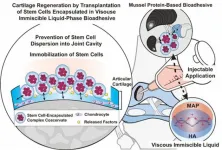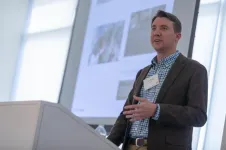(Press-News.org) Some people see moss growing in their gardens as a problem, but what they may not realise is this ancient ancestor of all plants is bringing lots of benefits to our green spaces, such as protecting against erosion.
Now a massive global study led by UNSW Sydney has found mosses are not just good for the garden, but are just as vital for the health of the entire planet when they grow on topsoil. Not only do they lay the foundations for plants to flourish in ecosystems around the world, they may play an important role mitigating against climate change by capturing vast amounts of carbon.
In a study published today in the journal Nature Geoscience, lead author Dr David Eldridge and more than 50 colleagues from international research institutions described how they collected samples of mosses growing on soil from more than 123 ecosystems across the globe, ranging from lush, tropical rainforest, to barren polar landscapes, through to arid deserts like those found in Australia. The researchers found that mosses cover a staggering 9.4 million km2 in the environments surveyed, which compares in size to Canada or China.
“We were originally really interested in how natural systems of native vegetation that haven't been disturbed much differ from human made systems like parks and gardens – our green spaces,” says Dr Eldridge, who is with UNSW’s School of Biological, Earth & Environmental Sciences.
“So for this study, we wanted to look at a bit more detail about mosses and what they actually do, in terms of providing essential services to the environment. We looked at what was happening in soils dominated by mosses and what was happening in soils where there were no mosses. And we were gobsmacked to find that mosses were doing all these amazing things.”
It turns out that mosses are the lifeblood of plant ecosystems, that plants actually benefit from having moss as a neighbour. The researchers assessed 24 ways that moss provided benefits to soil and other plants. In patches of soil where mosses were present, there was more nutrient cycling, decomposition of organic matter and even control of pathogens harmful to other plants and people.
On top of that, the authors say mosses may be instrumental in reabsorbing carbon dioxide. They estimated that compared to bare soils where there was no moss, this ancient precursor to plants is supporting the storage of 6.43 gigatonnes – or 6.43 billion tonnes – of carbon from the atmosphere. These levels of carbon capture are of a similar magnitude of levels of carbon release from agricultural practices such as land clearing and overgrazing.
“So you’ve got all the global emissions from land use change, such as grazing, clearing vegetation and activities associated with agriculture – we think mosses are sucking up six times more carbon dioxide, so it’s not one to one, it’s six times better,” Dr Eldridge says.
The researchers say that the positive ecological functions of soil mosses are also likely associated with their influence on surface microclimates, such as by affecting soil temperature and moisture.
What exactly is moss?
Mosses are different to vascular plants. They have roots and leaves, but their roots are different, with root-like growths called rhizoids that anchor them to the soil surface.
“Mosses don’t have the plumbing that an ordinary plant has, called a xylem and a phloem, which water moves through,” Dr Eldridge says.
“But moss survives by picking up water from the atmosphere. And some mosses, like the ones in the dry parts of Australia, curl when they get dry, but they don’t die – they live in suspended animation forever. We’ve taken mosses out of a packet after 100 years, squirted them with water and watched them come to life. Their cells don’t disintegrate like ordinary plants do.”
Without moss, our ecosystems would be in big trouble, says Dr Eldridge. He is amazed that people often see moss as a problem in urban settings when it’s actually playing an important role in nature.
“People think if moss is growing on soil it means the soil is sterile or has something wrong with it. But it's actually doing great things, you know, in terms of the chemistry of the soil, like adding more carbon and nitrogen, as well as being primary stabilisers when you get lots of disturbance.”
He says when you lose moss through land clearing or natural disturbances, you lose the ability to hold the soil together, leading to erosion.
“And it means you're going to lose nutrients, you're going to lose habitat for microbes, the whole system becomes destabilised.”
Moss can even come to the rescue in disturbed ecosystems. Dr Eldridge points to research examining the area around the Mount St Helens Volcano following a devastating eruption in the early 1980s. Most of the flora and fauna was denuded near the eruption site, but researchers who tracked how life returned to the mountain noticed that mosses were among the first forms of life to reappear.
“The first things to come back were cyanobacteria, blue green algae, because they're very primitive, and then mosses came back,” he says.
“What we show in our research is that where you have mosses you have a greater level of soil health, such as more carbon and more nitrogen. So they're helping to prime the soil for the return of trees, shrubs, and grasses, that eventually end up getting out-competed in the process. So they're the first guys that get in there and fix things up and then first to leave.”
Up next
Future research aims to examine whether urban mosses can create healthy soils as effectively as those growing in natural areas.
“We are also keen to develop strategies to reintroduce mosses into degraded soils to speed up the regeneration process,” Dr Eldridge says.
“Mosses may well provide the perfect vehicle to kick start the recovery of severely degraded urban and natural area soils.”
END
Why mosses are vital for the health of our soil and Earth
2023-05-03
ELSE PRESS RELEASES FROM THIS DATE:
Hongkui Zeng elected to the National Academy of Sciences
2023-05-03
Hongkui Zeng, Ph.D., Executive Vice President and Director of the Allen Institute for Brain Science, a division of the Allen Institute, was today elected to the prestigious National Academy of Sciences for her work to understand the cells and connections in the mammalian brain, and leading the development of tools and openly available data resources that accelerate brain research worldwide.
“I am deeply honored to become a member of the National Academy of Sciences, joining more than 3,000 brilliant scientists around the country and the world,” said Zeng. “I feel incredibly fortunate to work at the Allen Institute alongside ...
Dementia and self-harm: why it's crucial to support patients in first year after diagnosis
2023-05-03
People diagnosed with dementia are more likely to self-harm within the first six to 12 months after initial diagnosis, highlighting the need for health services to offer more follow-up support in this crucial period.
In what is believed to be the largest study of its kind, researchers with expertise in medicine, psychiatry and psychology at UNSW Sydney looked at NSW hospital data captured for more than 180,000 people admitted to hospital between 2001 and 2015.
The researchers analysed statistics relating to two cohorts of patients admitted to hospital: 154,811 people recorded as having dementia, and ...
Boxing can take the fight to Parkinson’s Disease
2023-05-03
When we think of boxing, it’s understandable many of us wouldn’t associate it with being ‘good’ for our brains.
However, new Edith Cowan University (ECU) research undertaken in partnership with The Perron Institute and boxer Rai Fazio has shown the sport — without an opponent — could be a valuable way for people suffering Parkinson’s Disease (PD) to improve their quality of life.
Also collaborating with Sir Charles Gairdner Hospital and the University of Western Australia, ECU researchers had 10 people with early-stage PD perform three one-hour boxing sessions per week, over 15 weeks.
Rather ...
HKU’s innovative research novelties excel at 48th International Exhibition of Inventions of Geneva
2023-05-03
The University of Hong Kong (HKU) triumphed at the 48th International Exhibition of Inventions of Geneva, winning a total of 19 awards, including two special grand prizes Invention & Innovation CAI Award (China Delegation), and Prize of the Delegation of Malaysia. The results were announced yesterday (April 28).
Research teams from Faculty of Architecture, Faculty of Engineering, Faculty of Science, LKS Faculty of Medicine, and two HKU Inno Laboratories, established under the Hong Kong Government's InnoHK programme, garnered two special grand prizes, one Gold Medal with the Congratulations of the Jury, six Gold Medals, six Silver Medals ...
A novel stem cell adhesive using mussels
2023-05-03
Cartilage is a tissue that protects bones by providing shock absorption and facilitates smooth joint movement. Unfortunately, due to its limited intrinsic healing capacity, stem cell transplantation is a promising therapeutic approach to address cartilage inflammation and damage, as well as to promote cartilage regeneration. However, a major limitation of this technique is the rapid disappearance of transplanted stem cells from the smooth cartilage surface and fluidic environment around cartilage, resulting in less effective treatment outcomes. Recently, a joint team of researchers from POSTECH, Dongguk University Medical Center, and Nature Gluetech in Korea ...
Virginia Tech researchers study the crowdsourced investigation of Jan. 6, 2021
2023-05-03
How has online sleuthing successfully replaced wanted posters?
Researchers within the Virginia Tech Department of Computer Science answered this question by studying the crowdsourced online investigation that followed the Jan. 6, 2021, insurrection at the U.S. Capitol.
“These online communities can provide real value, if they’re organized in the right way,” said Kurt Luther, associate professor of computer science and history. “These aren’t just digital witch hunts now that make false identifications. They can really make solid contributions to ongoing investigations by getting images in front of people, which ...
Survey: Half of parents believe their children’s mental health suffered due to social media during the past year
2023-05-03
COLUMBUS, Ohio (May 3, 2023) — Concerns continue to grow about the impact social media use has on the mental health and well-being of children and adolescents. According to a new national survey conducted online by The Harris Poll on behalf of The On Our Sleeves Movement For Children’s Mental Health, half (50%) of parents of children younger than 18 feel their child(ren)’s mental health has suffered during the past 12 months because of social media use.
To best understand how social media is impacting their children’s mental health, On Our Sleeves encourages parents and caregivers to sit down and have ...
Engineers tap into good vibrations to power the Internet of Things
2023-05-03
In a world hungry for clean energy, engineers have created a new material that converts the simple mechanical vibrations all around us into electricity to power sensors in everything from pacemakers to spacecraft.
The first of its kind and the product of a decade of work by researchers at the University of Waterloo and the University of Toronto, the novel generating system is compact, reliable, low-cost and very, very green.
“Our breakthrough will have a significant social and economic impact by reducing our reliance on non-renewable power sources,” said Asif Khan, a ...
Texas A&M researcher receives $3M National Science Foundation manufacturing grant
2023-05-02
Dr. Zhijian “Z.J.” Pei and his intercollegiate team recently received the Future Manufacturing Research Grant from the National Science Foundation’s Future Manufacturing program, which funds researchers to develop new manufacturing capability that does not exist today. The focus of this research grant is to substitute products made from petroleum-based plastics or natural wood with biomass.
“Our idea is to use living matter, including fungi, algae, bacteria, plus agriculturally derived biomass and use 3D printing to make products,” said Pei, professor in the Wm Michael Barnes ’64 ...
Crossroads: The role of biomarkers in the management of lumps in the breast
2023-05-02
“A biomarker or set of biomarkers to inform on the individual progression risk would be beneficial to the patient and cost-effective for the healthcare system."
BUFFALO, NY- May 2, 2023 – A new research perspective was published in Oncotarget's Volume 14 on April 24, 2023, entitled, “Crossroads: the role of biomarkers in the management of lumps in the breast.”
Here, Dr. Georg F. Weber from the University of Cincinnati Academic Health Center discusses a long-standing issue in women’s health: ...





